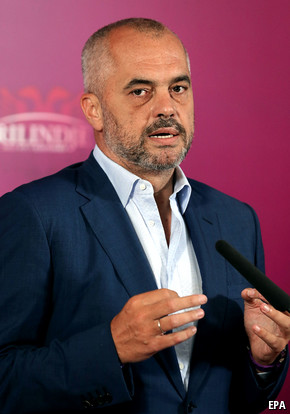Getting it together
A new government has a lot to live up to
Aug 31st 2013 |From the print edition

Renaissance man: Edi Rama
EDI RAMA won election in June offering a “renaissance”. Albanians will have to wait until parliament convenes on September 9th, but hopes for the former mayor of Tirana, the capital, and his Socialist Party are already high—a “new Camelot” says a foreign official. The new government is mostly young. Six women are in the cabinet: one is defence minister. Several ministers, such as Erion Veliaj, who ran a successful anti-corruption group, have backgrounds outside mainstream politics.
Albanians were ready for a change from the era of Sali Berisha, a towering figure who straddled politics for two decades. Though it is one of the few European countries not to have experienced a recession in recent years, worries about crime and corruption have helped to slow Albania’s integration into the European Union: after three years of failed attempts, it may gain candidate status in December. Mr Veliaj says the government’s aim is to reassert the state’s authority: illegal construction is rampant, as are backhanders in the health-care and education systems. He wants to re-examine big public procurement deals. He also talks of stamping out massive tax evasion and says that the “unfair” flat tax is to be replaced by a system of tiered rates.
Some election promises will be hard to fulfil. How, asks Albert Rakipi, head of the Albanian Institute for International Studies, can the government possibly create the 300,000 jobs promised during the campaign? Gerald Knaus of the European Stability Initiative, a think-tank, says that Albania has plenty of potential but has lacked vision. For much of the past decade it lived off a construction boom fuelled by remittances. Now it needs to encourage expansion in its shoe and textile industry, which already provides 29% of exports, and look to other small countries such as Estonia for inspiration. Its people are young, he notes, yet only 42% of the working-age population actually work.
Mr Rama will need to move fast. Party grandees are disgruntled: they expected to be rewarded with jobs after the election. They will play along for now, as will Ilir Meta, his coalition partner and, in reality, co-prime minister, some say. His socialist splinter party brought down the previous government. But if either lot senses weakness, knives will come out. Camelot, but with Albanian characteristics.
No comments:
Post a Comment